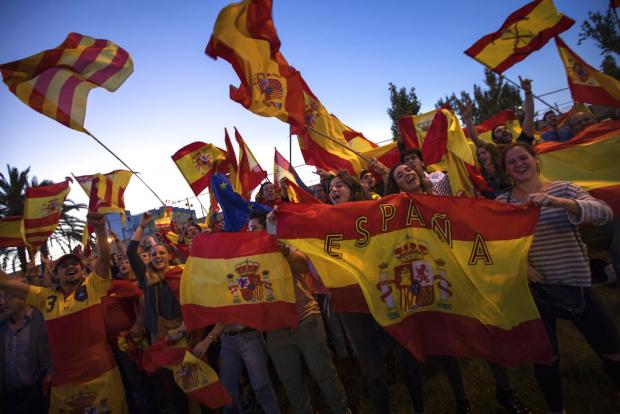Barcelona braces for march to reject Catalan independence

Nationalist activists hold Spanish flags as they cheer the national police officers guarding one of the main entrances at the port of Barcelona, Spain, Saturday Oct. 28, 2017. About 300 pro union activists drove through Barcelona center with cars and motorcycles and reached the port to show solidarity toward the Guardia Civil national police, based at the Barcelona harbor. (Photo by EMILIO MORENATTI / AP)
Published: 4:23 p.m., Oct. 29, 2017 | Updated: 6:56 p.m., Oct. 29, 2017
BARCELONA, Spain — Crowds began gathering in central Barcelona Sunday morning ahead of what was expected to be a major demonstration in favor of Spain’s unity, two days after a Catalan independence declaration led to the regional government’s dismissal by Spain.
Organizers say the march’s goal is to defend Spain’s unity and reject “an unprecedented attack in the history of democracy.” Their slogan will be “We are all Catalonia. Common sense for coexistence!” Members of the central government and main pro-union parties are expected to join.
Societat Civil Catalan has called for those who oppose Catalan independence to march at noon Sunday (1100 GMT; 7 a.m. EDT |6 p.m. PHT). Hundreds of people, many draped with the Spanish flag, were gathering in the city center hours before the arranged time.
Three weeks ago, the same group organized a mass rally that brought hundreds of thousands onto Barcelona’s streets.
Article continues after this advertisementNo pro-independence marches were expected Sunday. Catalonia’s ousted leader has called for Catalans to engage in peaceful opposition.
Article continues after this advertisementThe vote by pro-independence lawmakers Friday in favour of independence, and Madrid’s response triggering unprecedented constitutional powers taking control of Catalan affairs, was the climax of Spain’s worst political crisis in decades.
Spanish Prime Minister Mariano Rajoy also dissolved Catalonia’s parliament and called a new regional election for Dec. 21.
Friday’s vote in the Catalan parliament to secede came after an illegal Oct. 1 referendum in Catalonia in favor of independence. Spain’s constitutional court had outlawed the vote, and opponents to secession had boycotted the process. Voting on the day itself was marred by violence when national police clashed with people attempting to cast their ballots, in what was widely seen in the region as a heavy-handed response by Spanish police. But Spain’s government said that the police response was proportionate to the resistance that officers met.
Ousted Catalan president Carles Puigdemont issued a televised address Saturday calling for peaceful opposition to the central Spanish government’s move, saying he and other regional officials fired by Madrid would keep “working to build a free country.”
His comments were a veiled refusal to accept his Cabinet’s dismissal as ordered by central authorities.
Following their official dismissal, Puigdemont and the 12 members who until Saturday made up the Catalan Cabinet are no longer paid.
Spain’s government has said they could be charged with usurping others’ functions if they refuse to obey, which could throw the region into further turmoil by prolonging a monthlong standoff.
Separately, a Belgian government official said Sunday it would be “not unrealistic” for Puigdemont to ask for asylum, and warned it would create serious diplomatic difficulties with fellow European Union member state Spain.
Asylum State Secretary Theo Francken said on Twitter that “it is possible to ask for asylum as an EU subject” in Belgium, adding it was up to independent asylum authorities whether to grant it.
The 28-nation EU is considered a bloc where the rule of law applies and granting asylum based on arguments that repression would endanger the full exercise of one’s rights would be exceptional.
“If you assess the situation at this stage, including the prison terms and the repression from Madrid,” Francken told VTM network, “there is the question whether a person like that can get a fair trial, of course.”
In another tweet, he stressed Belgium wasn’t seeking such a scenario. “I am not rolling out the welcome mat,” he said.
In the past, some Basque separatists have asked for asylum in Belgium and weren’t extradited to Spain, causing years of friction.